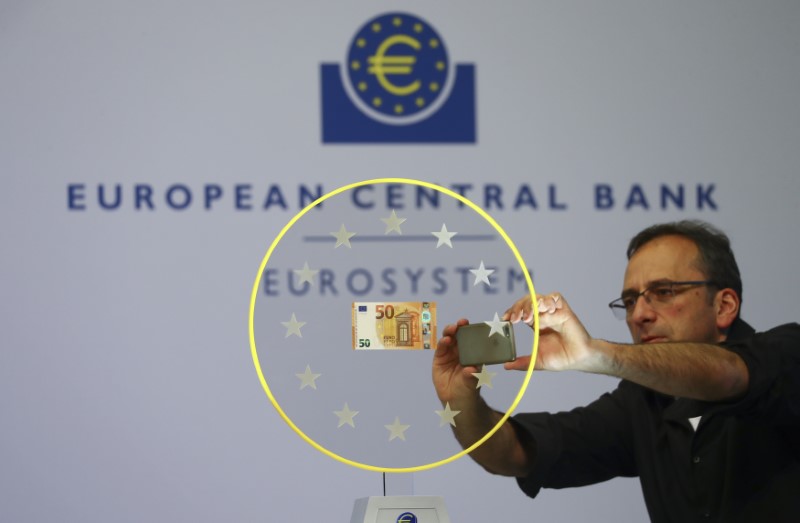By Hilary Russ
NEW YORK (Reuters) - The euro surged on Thursday after the European Central Bank indicated it was preparing to scale back its stimulus programme, while gold rose to a one-year high after the U.S. dollar tumbled.
The dollar index, which measures the greenback against a basket of six major rivals, fell as much as 1.1 percent to 91.405, its lowest since January 2015.
It also fell against the euro as ECB head Mario Draghi said the central bank was looking at how to wind down its 60 billion-euro-a-month buying programme. The bank kept its growth and inflation outlooks unchanged.
"We will be ready for much of what we have to decide (to scale back stimulus) by October," Draghi said at the ECB's post-meeting news conference.
The euro soared to a nine-day high of $1.2059. It was last up 0.92 percent at $1.2025.
Major world stock markets climbed, while the day's gains in European stocks were halved at the prospect of ongoing euro strength.
The pan-European FTSEurofirst 300 index rose 0.23 percent and MSCI's gauge of stocks across the globe gained 0.32 percent.
The price of gold rose to a one-year peak after the dollar tumbled on weak U.S. jobs data and unchanged expectations for growth and inflation from the ECB.
In the United States, the economic outlook was less clear.
Markets were still digesting comments on Tuesday from influential dovish Federal Reserve Governor Lael Brainard, who said the Fed should delay raising interest rates until it is confident inflation that is now "well short" of target will rebound.
The dollar also fell against the yen as traders grew uncomfortable with the outlook for U.S. fiscal policy once a three-month extension to the U.S. debt limit that U.S. President Donald Trump said he agreed to on Wednesday expires.
"The risk for the dollar still exists," said Kathy Lien, managing director at BK Asset Management in New York. "The can has been kicked down the road, so the problem hasn’t been resolved."
Stocks were damped down by a Labor Department report that showed the number of Americans filing for unemployment benefits jumped to its highest in more than two years last week amid a surge in applications in hurricane-ravaged Texas.
Another major hurricane, Irma, was on track to hit Florida by the weekend after decimating the Caribbean, further pressuring risk-on sentiment. (N)
The Dow Jones Industrial Average fell 22.86 points, or 0.1 percent, to 21,784.78, the S&P 500 lost 0.44 points, or 0.02 percent, to 2,465.1 and the Nasdaq Composite added 4.56 points, or 0.07 percent, to 6,397.87.
Spot gold added 1.1 percent to $1,348.53 an ounce. U.S. gold futures gained 1.07 percent to $1,353.30 an ounce.
Oil futures were mixed, with Brent rising to a 5-1/2 month high while U.S. crude slipped on a bigger-than expected crude stock build, as the restart of U.S. refiners after Hurricane Harvey was countered by the threat of Hurricane Irma. [O/R]

U.S. crude fell 0.06 percent to $49.13 per barrel and Brent was last at $54.51, up 0.57 percent on the day.